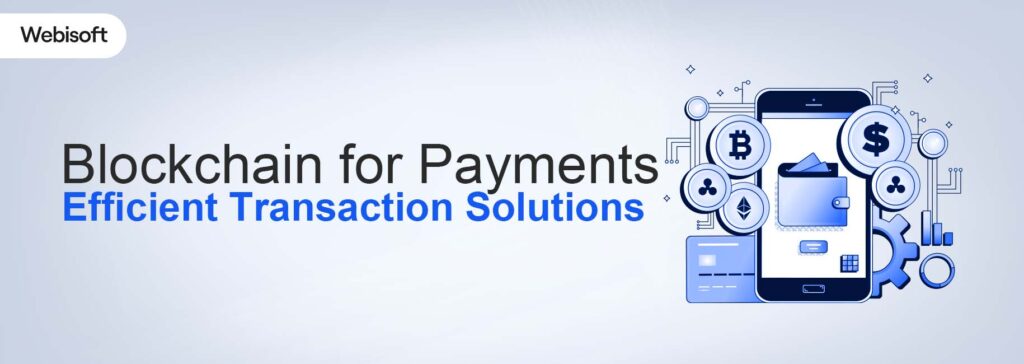Blockchain for payments represents a revolutionary shift in how financial transactions are conducted. At its core, blockchain technology is a perfect digital ledger.
This innovation offers numerous advantages, including increased security, faster transaction processing, and reduced costs.
Many users enjoy these benefits, from businesses engaging in global trade to individual consumers seeking more efficient and secure ways to manage their finances.
However, choosing the right blockchain payment method matters because it ensures secure, fast, and transparent transactions.
A perfect blockchain payment system guarantees trust among users, eliminates middlemen, lowers fees, and enables global transactions.
So, are you ready to experience the future of financial transactions? Explore Webisoft‘s cutting-edge blockchain solutions for payments and join the revolution in secure and efficient financial exchanges.
Let’s get more insight through this guide!
Contents
- 1 What is Blockchain?
- 2 What is a Blockchain-Based Payment Platform?
- 3 What Are the Advantages of Blockchain In Payments?
- 4 How Does Blockchain Payment System Work?
- 5 How Can You Address the Blockchain Payment Systems Challenges?
- 6 How Can You Perfectly Implement a Blockchain Payment System?
- 7 What are the Use Cases of Blockchain in Payments?
- 8 How is Blockchain Used for Transactions?
- 9 Top Blockchain Payments Companies?
- 10 Who Benefits from Blockchain Payments?
- 11 What Blockchain-Based Payment Solution does Webisoft Offer?
- 12 Final Note
- 13 Frequently Asked Questions
What is Blockchain?
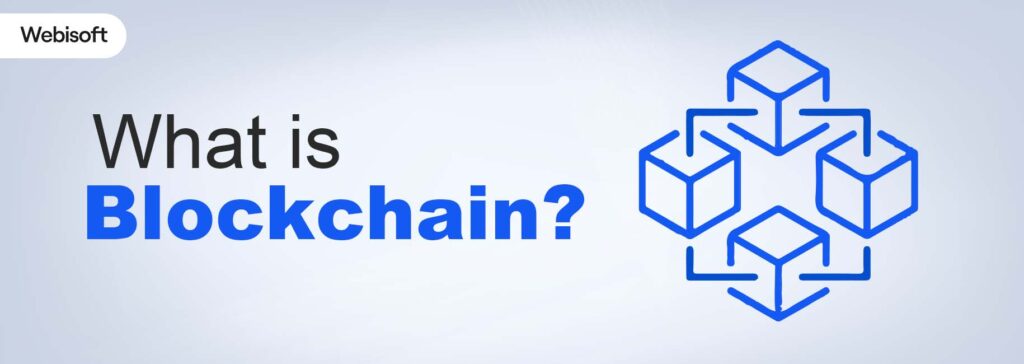
Blockchain stands as a groundbreaking technology, revolutionizing how we handle digital information. Imagine a chain of blocks, each holding batches of transactions.
Anyway, blockchain is an accurate digital ledger that records transactions across many computers. Its design prevents alterations to the data, ensuring high security.
Bblockchain’s impact is significant in various sectors, not just finance. Its ability to maintain a safe, secure, and decentralized record of transactions makes it appealing.
However, with blockchain, everyone shares the same documentation rather than individual copies. Blockchain’s beauty lies in its trustworthiness.
What is a Blockchain-Based Payment Platform?
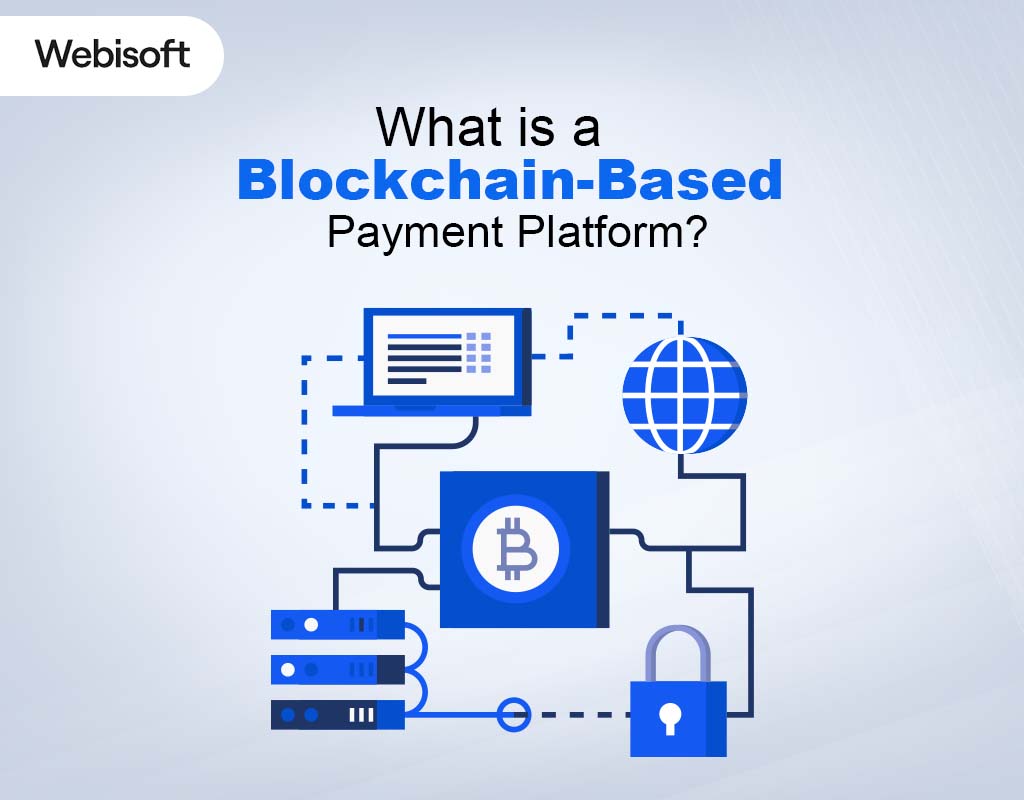
A blockchain-based payment platform operates on the principles of blockchain technology. These platforms offer a new way of transferring value digitally. They’re like digital wallets but with blockchain’s added security and efficiency.
You might wonder how these platforms differ from regular payment methods. The key lies in decentralization. Traditional payment systems rely on central authorities like banks.
Blockchain-based platforms, however, distribute the control across a network of computers. This distribution enhances security and reduces the risk of fraud.
However, blockchain financial operations are another aspect worth mentioning. Every transaction on a blockchain-based platform is verified and recorded. This process ensures that each transaction is secure and transparent.
What Are the Advantages of Blockchain In Payments?
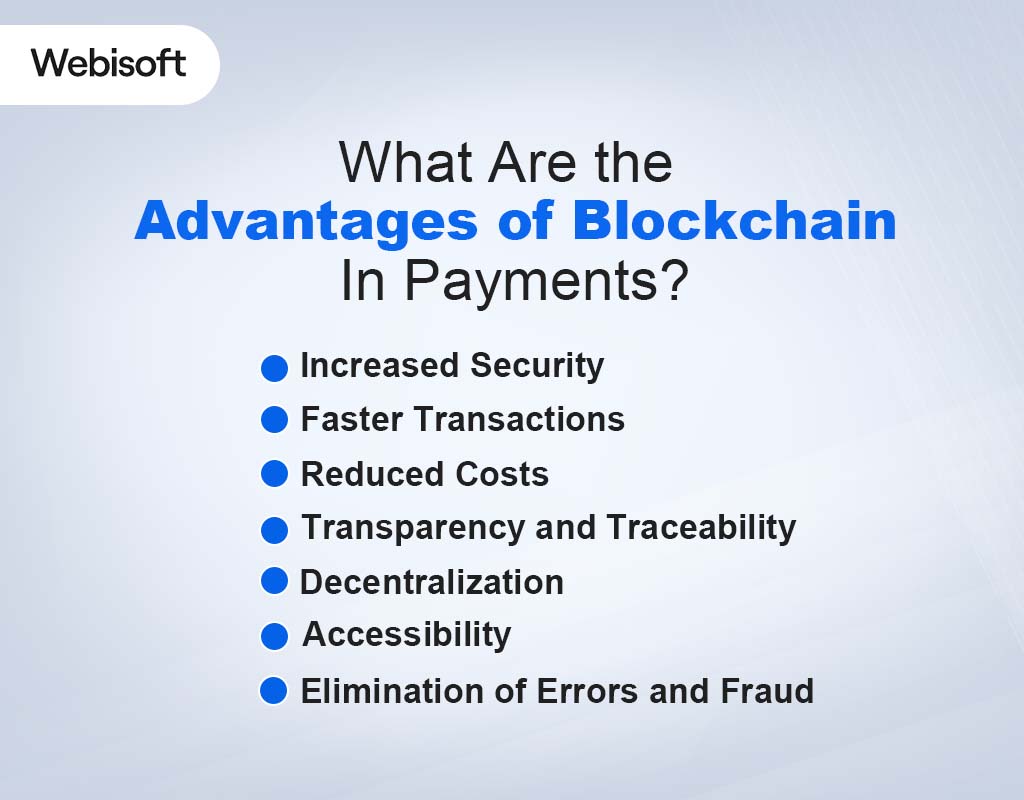
The basic benefits of blockchain in payments are:
1. Increased Security
Blockchain technology significantly enhances payment security. Each transaction forms part of a block linked to previous and subsequent blocks. This linkage creates an unalterable chain, safeguarding against fraud and unauthorized activity.
2. Faster Transactions
Payments via blockchain are notably quicker. Traditional bank processes can take days, especially for international transactions. Blockchain, however, often completes transactions in minutes or even seconds.
3. Reduced Costs
Blockchain cuts down transaction costs by eliminating middlemen like banks and payment processing companies. This reduction in fees is a significant advantage for businesses considering the cost of blockchain solutions.
4. Transparency and Traceability
Every transaction on a blockchain is visible and traceable. This transparency ensures users can track their payments effortlessly, fostering trust in the system.
5. Decentralization
Decentralization is a key advantage. Unlike traditional systems controlled by specific entities, blockchain operates across a network of computers. This approach democratizes financial transactions.
6. Accessibility
Blockchain opens up financial services to persons who can’t access the traditional bank. People without access to traditional banking can participate in the global economy through blockchain-based transactions.
7. Elimination of Errors and Fraud
Blockchain’s immutable ledger minimizes errors and fraud in payments. Once recorded, the information cannot be altered, ensuring accuracy and reliability.
How Does Blockchain Payment System Work?
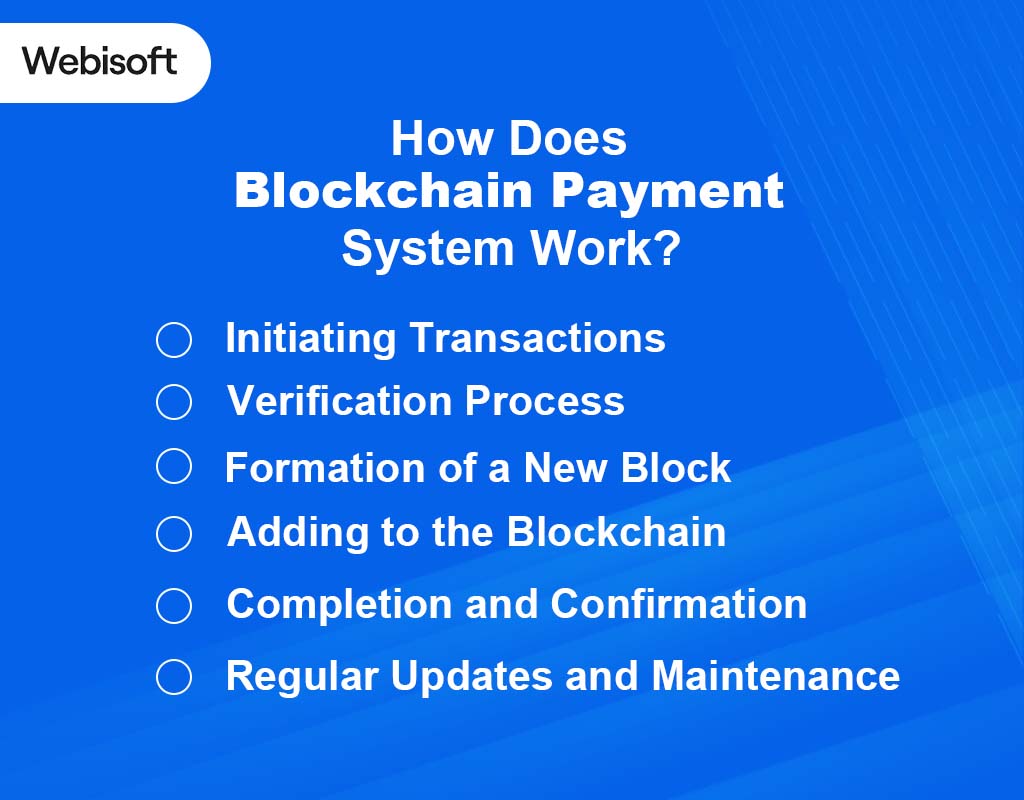
In a blockchain payment system, your transactions get verified and added to a block. These blocks form an unchangeable chain, securing your payments through decentralized verification by multiple participants.
However, this process ensures transparency, immutability, and security in your financial transactions.
Initiating Transactions
A blockchain payment starts with the initiation of a transaction. The sender transfers digital assets or cryptocurrency to the recipient’s blockchain address.
Verification Process
Network nodes, or computers then verify the transaction. They check its validity based on the blockchain’s protocol and past transaction history, ensuring legitimacy.
Formation of a New Block
Once verified, the transaction becomes part of a new block. This block also contains a unique cryptographic hash and the previous block’s hash. Ultimately, it creates a secure link.
Adding to the Blockchain
The new block is then added to the blockchain. This addition is permanent and unchangeable, providing an immutable transaction record.
Completion and Confirmation
Finally, the transaction is completed. The recipient receives a notification, often with blockchain payment proof, confirming the successful transfer of funds.
Utilization of Blockchain Payment Gateways
Blockchain payment gateways facilitate these transactions. They act as intermediaries, ensuring seamless integration of blockchain technology with existing financial systems.
How Can You Address the Blockchain Payment Systems Challenges?
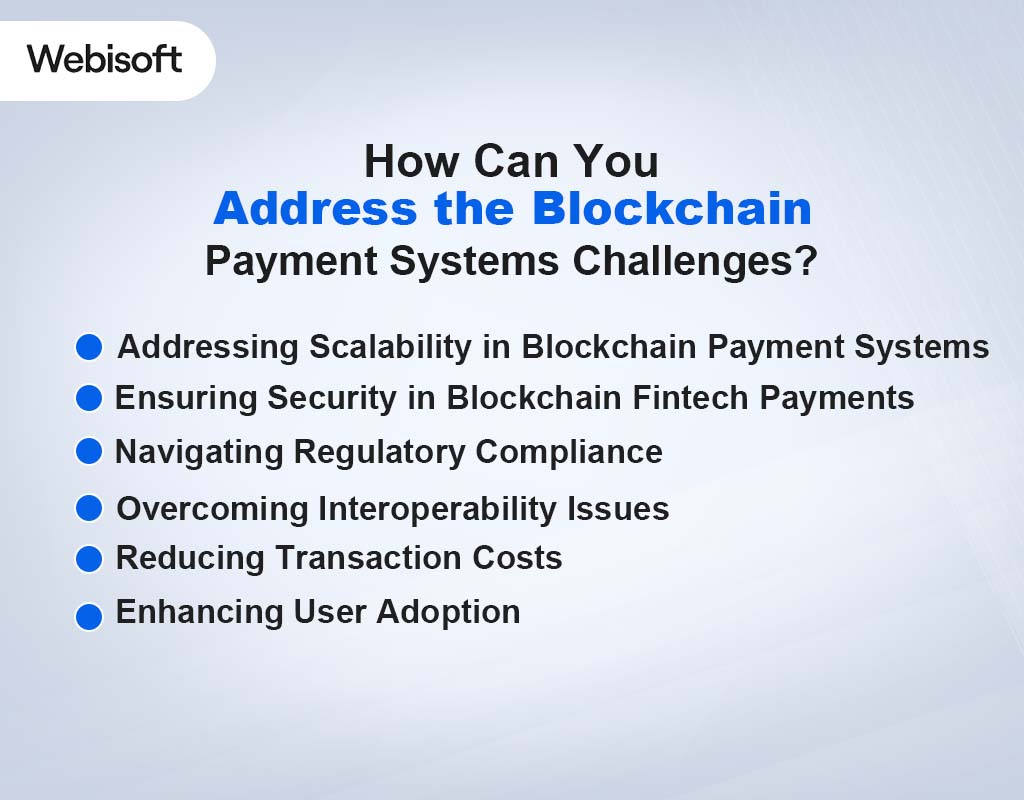
Blockchain payment systems, like any innovation, come with challenges. Those are:
Addressing Scalability in Blockchain Payment Systems
Scalability is a key challenge in blockchain payment systems. As user numbers grow, the system must handle more transactions efficiently. Upgrading network capacity and adopting efficient processing methods are essential.
Ensuring Security in Blockchain Fintech Payments
In blockchain fintech payments, security is paramount. Regular security audits and updates help maintain robustness. Educating users on safe practices enhances overall security.
Navigating Regulatory Compliance
Regulatory compliance varies across regions, especially in blockchain for cross-border payments. Staying informed and compliant is crucial. Collaboration with legal experts can provide necessary guidance.
Overcoming Interoperability Issues
Interoperability among different blockchain networks is often limited. Developing standards for seamless integration is critical. This ensures smoother transactions in various blockchain payment use cases.
Reducing Transaction Costs
Transaction costs can hinder the adoption of blockchain payment systems. Optimizing network efficiency and exploring cost-effective solutions are key strategies. Collaboration can also help in reducing expenses.
Enhancing User Adoption
User adoption is necessary for the blockchain payment system’s success. Simplifying the technology and demonstrating its benefits can encourage wider use. Clear education and communication are vital.
How Can You Perfectly Implement a Blockchain Payment System?
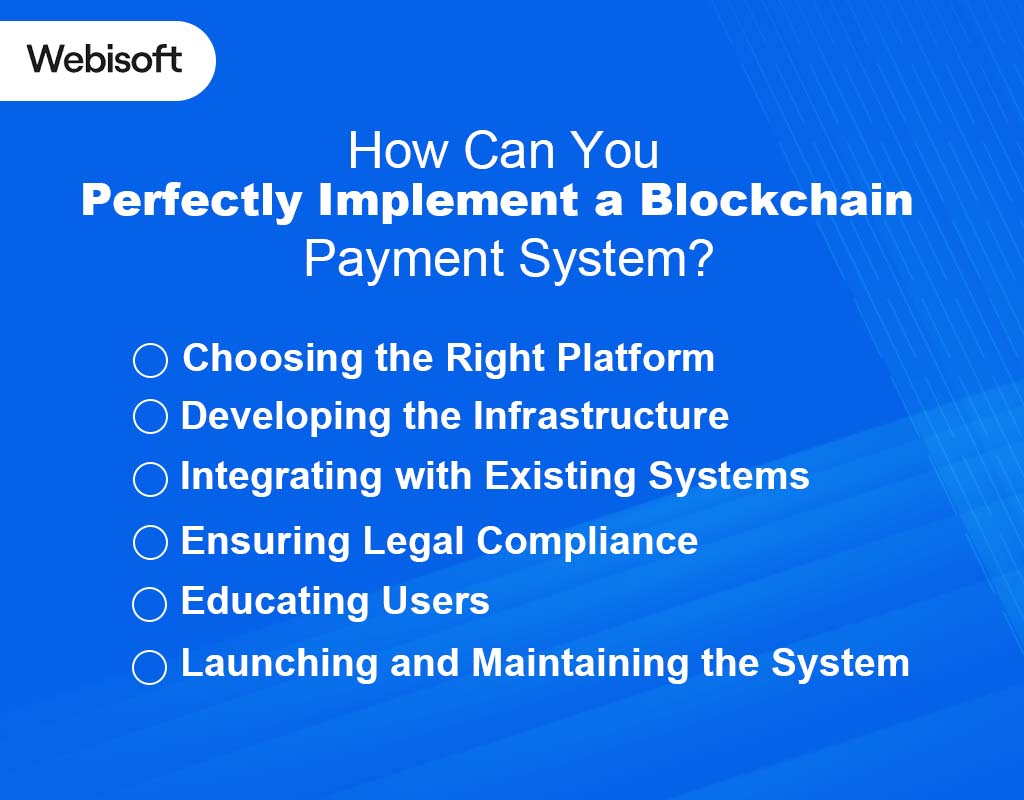
Implementing a blockchain payment system involves choosing the right platform, developing the infrastructure and integrating with existing systems. Also the implementation system includes ensuring legal compliance, educating users, and finally launching and maintaining the system.
By going through the details below you will get to learn its every step. So, keep going!
Choosing the Right Platform
When you’re picking the platform that suits you best, think about what you need most. Speedy transactions, scalability, and top-notch security need to match up with what your business demands. Doing some solid research helps you make a smart call.
Developing the Infrastructure
Getting all the gear and software set up just right is crucial. You’ve got to make sure everything works smoothly. Getting help from blockchain developers when you’re outsourcing this part can make a real difference for you.
Integrating with Existing Systems
Making sure this new system fits snugly with what you already have is a must. It’s all about customizing and testing to make sure it blends well with what you’re used to.
Ensuring Legal Compliance
Sticking to the rules is non-negotiable. There are laws and regulations you’ve got to follow. Chatting with legal experts who know their stuff about blockchain can save you a ton of headaches down the road.
Educating Users
Teaching your team and customers about this new system is super important. If they understand how it works and why it’s awesome, they’ll be more likely to use it. Show them the ropes and keep that communication flowing.
Launching and Maintaining the System
Start small when you’re ready to launch to catch any hiccups early on. Once it’s up and running, you’ve got to keep it in tip-top shape. Regular check-ups and updates make sure everything runs smoothly and stays secure. That’s how you make sure this new payment system lasts and works like a charm for you.
What are the Use Cases of Blockchain in Payments?
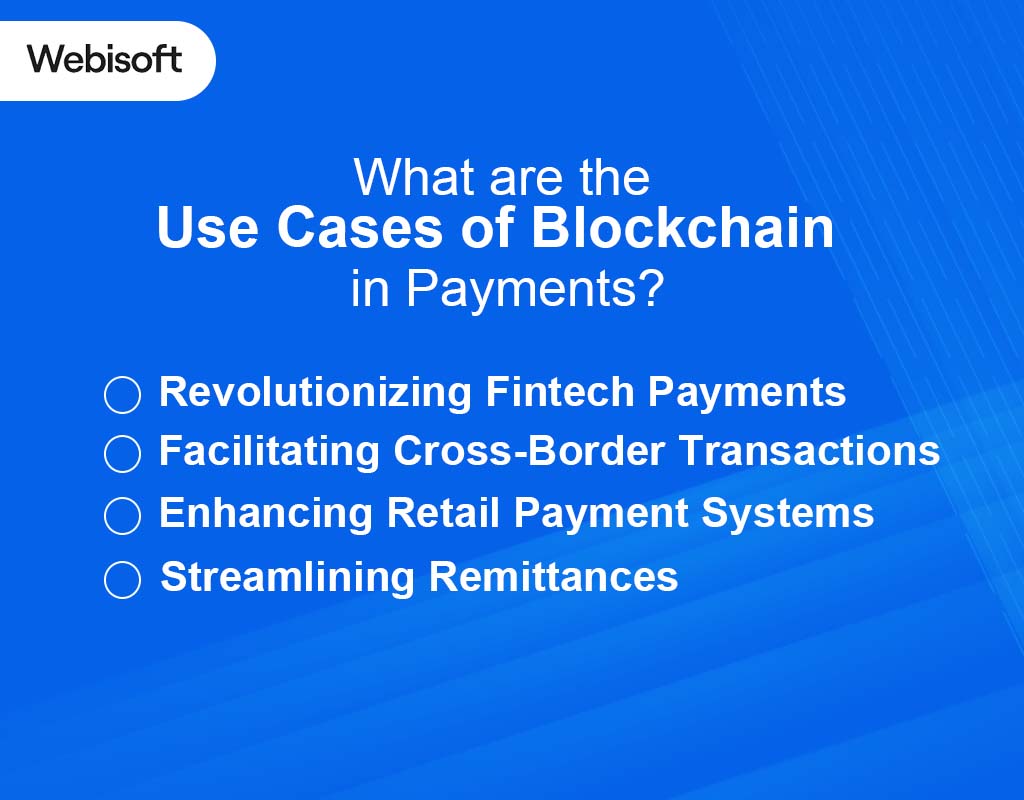
Blockchain technology offers a range of applications in the payment sector, from enhancing fintech payments to facilitating cross-border transactions and more.
1. Revolutionizing Fintech Payments
Blockchain is transforming the way we think about financial transactions. In fintech, it ensures secure, transparent, and swift payments. Businesses and individuals benefit from its reliability and efficiency.
2. Facilitating Cross-Border Transactions
One standout use is in cross-border payments. Blockchain simplifies these transactions, making them faster and less costly. It’s an innovative solution for global money transfers.
3. Enhancing Retail Payment Systems
In the retail sector, blockchain brings new security and speed to transactions. Retailers and consumers enjoy improved efficiency and safety in their financial dealings.
4. Streamlining Remittances
Blockchain significantly reduces costs and time in remittances. This especially benefits individuals sending money internationally, offering a more economical and faster alternative.
How is Blockchain Used for Transactions?
Blockchain’s use in electronic transaction security, transparency, and efficiency significantly uplifts how financial transactions are conducted worldwide.
Securing Transactions with Blockchain
Blockchain acts as a digital ledger, providing unparalleled security in transaction recording. Its tamper-proof nature ensures the integrity and trustworthiness of every transaction.
Increasing Transparency in Transactions
Transparency is a hallmark of blockchain technology. Each transaction is visible and verifiable by all parties involved, greatly reducing fraud risks and enhancing trust.
Automating Contracts with Smart Contracts
Blockchain introduces smart contracts into the transaction process. These self-executing contracts with embedded terms streamline and secure dealings, minimizing the need for middlemen.
Enabling Micropayments
Blockchain in the supply chain supports even the smallest transactions effectively. This capability opens up new avenues for online content monetization and various microtransactions-based business models.
Top Blockchain Payments Companies?
The top blockchain payments companies are:
Bitcoin
Bitcoin is like digital gold. It was the first cryptocurrency and works on a decentralized network called blockchain. You can use it to buy stuff or hold onto it as an investment.
Transactions are secure, transparent, and don’t involve banks or middlemen. Just like physical cash, you can send Bitcoin directly to someone without needing a third party.
Ethereum
Ethereum isn’t just about money; it’s a platform for building all sorts of things using smart contracts.
However, it runs on smart contracts and blockchain, letting developers create decentralized apps (DApps) and new cryptocurrencies. Its currency, Ether, fuels the network and can also be used for transactions within the Ethereum ecosystem.
Ripple (XRP)
Ripple focuses on making global transactions super fast and cheap, especially for banks and financial institutions.
It uses a different kind of technology compared to Bitcoin and Ethereum called the Ripple Protocol Consensus Algorithm. XRP, Ripple’s cryptocurrency, aims to bridge different currencies and facilitate cross-border payments.
Litecoin
Litecoin is a lot like Bitcoin but faster and with lower transaction fees. It’s seen as the silver to Bitcoin’s gold. It was created to handle transactions quicker, making it more suitable for everyday purchases.
The technology behind Litecoin is similar to Bitcoin, but it uses a different algorithm, making transactions quicker to process.
Stellar
Stellar aims to make sending money across borders easy and affordable for everyone. It connects banks, payment systems, and people to move money quickly and at a low cost.
However, the Stellar network uses its native cryptocurrency, Lumens (XLM), to facilitate these transactions. Its goal is to support financial inclusion and help those who don’t have access to traditional banking systems.
Who Benefits from Blockchain Payments?
Small businesses and international traders can get the most from blockchain payments. They can enjoy reduced transaction fees and faster cross-border payments.
Customers also benefit from enhanced security and transparency. This is particularly true for blockchain payment cases involving large amounts of sensitive data. Overall, blockchain brings financial empowerment and efficiency to its users.
Businesses and Consumers in Fintech
In the fintech sector, both businesses and consumers can enjoy significant benefits. Thanks to blockchain technology, they enjoy enhanced security, reduced costs, and improved transaction speed. For a deeper understanding of how blockchain is transforming the insurance sector, check out our article on Blockchain for Insurance Companies.
Participants in Cross-Border Transactions
Individuals and businesses involved in cross-border payments greatly benefit from blockchain. It simplifies and accelerates these transactions, making them more accessible and cost-effective.
Users of Decentralized Payment Systems
People using decentralized blockchain payment systems gain from increased transparency and security. These systems offer an alternative to traditional banking, providing more control and reduced fees.
What Blockchain-Based Payment Solution does Webisoft Offer?
Webisoft excels in offering custom-made blockchain payment systems. Our solutions focus on user-friendly experiences and robust security. However, Webisoft’s platforms are ideal for blockchain for cross-border payments.
Moreover, we ensure fast, secure, and cost-effective transactions. These features make Webisoft an attractive option for those seeking efficient blockchain fintech solutions.
Blockchain technology is revolutionizing how we handle payments. It immensely benefits various stakeholders, from small businesses to individual users.
Companies like Webisoft are at the forefront, providing innovative solutions that connect the power of blockchain for everyday transactions. Whether for security, speed, or cost-efficiency, blockchain’s role in the financial sector is increasingly indispensable.
Final Note
Blockchain for payments stands as a significant advancement in the financial sector. Its ability to provide secure, transparent, and rapid transactions has revolutionized how we think about money transfers and economic interactions.
From large corporations to individual consumers, the benefits of blockchain technology in payments are far-reaching and transformative.
However, discover the potential of blockchain for your payment needs with Webisoft. And step into a world of secure, efficient, and seamless financial transactions. Join us in leading a more transparent and efficient financial future.
Frequently Asked Questions
How does Webisoft use blockchain for payments?
Webisoft uses blockchain to make payments super secure and speedy. Imagine sending money like an instant message – that’s how quick and safe it is with Webisoft’s blockchain technology.
Why is blockchain better for payments?
Blockchain is better because it’s like a vault and a record book in one. It keeps your money safe while making sure every transaction is recorded clearly. This means fewer mistakes and no sneaky business.
Can blockchain for payments reduce costs?
Absolutely! Blockchain cuts out the middleman, like banks, which often charge fees. With blockchain, it’s like handing money directly to someone, which can save you a bit on those pesky extra charges.
Is blockchain for payments secure?
Very secure! It’s like having a lock that only you and the receiver can open. Blockchain uses complex math to keep your transactions safe from hackers.
How fast are blockchain payments with Webisoft?
Super fast! Webisoft’s blockchain payments are like sending a text message – almost instant. It means no more waiting days for a transaction to go through.
